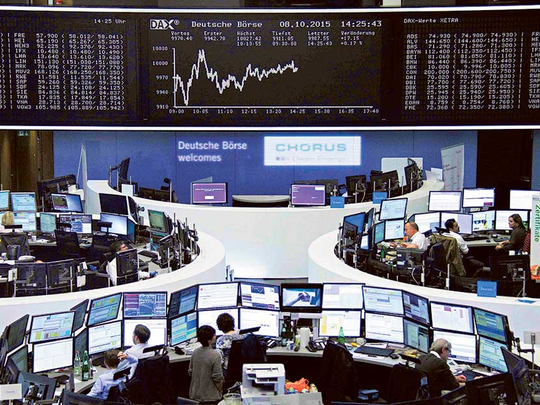
Dubai: Part of the MSCI emerging market index, the Dubai’s main gauge has shed more than a fifth of its value in the past year to trade near the 3,500 mark. Also Brent crude, from which the countries in the GCC derive most of their revenues, has shed more than half of its value since November 2014.
The property sector isn’t doing that well either. Rental yields, as well as values, have fallen slightly from its 2015 high. So, the moot question is where should investors in the UAE or GCC look for returns as some amount of stability has returned to world stock markets?
In an exclusive interview with Gulf News, a senior bank official advises UAE and GCC investors to look at developed markets for yields, with growth returns and inflation on the horizon.
Paul Donovan, Managing Director, Global Economist, UBS Investment Bank , said that concerns about growth in developed market have been overdone.
"This is an environment that is relatively supportive for risk assets. It’s an environment where the Federal Reserve might raise rates, that’s adjustments the international investors need to make."
"In this situation, the disinflation trend is very rapidly coming to an end. Inflation in the US is expected to be 1.5 per cent and in Europe over 1 per cent because of a limited downside in oil prices. So in case of an inflation shock investors will have to abandon the disinflation mindset,” Donovan told Gulf News over telephone from Kuwait.
Risk assets
UBS expects developed markets to outperform its world peers,
“This is an environment that we are still looking developed economy market to continue to perform relatively well, and even better than emerging markets. It’s an environment where risk assets should continue to be supported, that means it would be growth environment, which would be helpful for risk assets.
“With the rising policy rates, risk assets would outperform bonds. We are likely to see a rise in bond yields in a year or so. Equities would be a better performing class,” Donovan said.
Investors can go in for risky assets as there is some degree of stability now in financial markets with stability coming back to crude oil too.
UBS is overweight on European equites, reflecting the fact that economic recovery is in an early stage, and the US economic recovery is relatively mature. Valuations are still attractive in Europe, and there is more potential positive surprises in Europe than anything else.
Stable Brent
“Probably we may see better and stable demand coming out of China. The economy may be slowing but the intensity of its growth in the use of commodities would be rising,” Donovan said.
UBS expects Brent prices to average about $50 per barrel next year. with a 15 per cent gain in 2015, and expects higher average prices in 2016.
“Chinese growth in the future is expected to be more commodity intensive than in the past, so we may see slower rate of growth in China, but within that slower rate of growth, we may see more energy or commodities being demanded, so we will have more quality intensive growth."
"The demand for oil is not weak, but we may see an increased demand for oil in the next 6-12 months. So we expect a greater period of stability,” Donovan added.
Investment flows
Global investment flows have slowed down, and the country bias has increased, and this has been a global phenomenon over the last five years. Investors keep their money closer to home as a general rule, UBS said.
“For private investors, the issue has been where they want to diversify their risk. Portfolio diversification is a more central approach for investors in a volatile environment and with structural change. Diversification would be to expand and broadening the range of assets and broadening the range of geographies,” he added.
However, he has urged investors to view emerging markets as an individual market instead of as a bloc.
“The idea of emerging markets as a bloc is over. Investors need to look at individual markets than look them as a group because we are witnessing very different drivers, fundamentals, and very very different policy responses,” he added.





